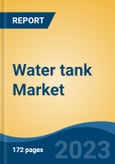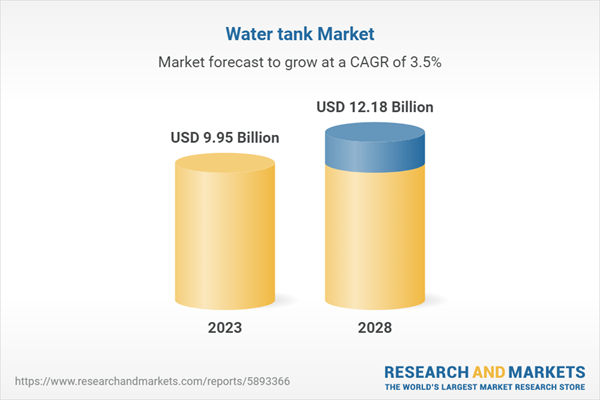Speak directly to the analyst to clarify any post sales queries you may have.
10% Free customizationThis report comes with 10% free customization, enabling you to add data that meets your specific business needs.
A water tank is a container that holds water and is used for a variety of purposes, including chemical manufacture, fire suppression, irrigation, agriculture, farming, raising plants and animals, etc. With a variety of material options, a water tank may be made to order and tailored according to specifications.
There are numerous sorts of water kept there at different periods, including potable water, rainfall, irrigation water, water for building, water for animals, and water for use inside homes. Water tanks are used in houses and numerous organisations. They are often made of polyethylene, steel, or fibreglass. They may be found in many shapes and sizes, ranging from 200 to more than 10,000 litres. Due to their widespread availability and simple installation, plastic or polyethylene water tanks are the most popular water storage containers worldwide. The annual growth in the number of homes and other structures being built throughout the globe is a major factor driving the market for water tanks. Additionally, the use of water tanks in the building, farming, and aquaculture sectors has led to consistent sales globally, supporting the increase of the market for water tanks. However, since most plastic tanks are known to change the characteristics of water, the problem of water safety in plastic water tanks considerably inhibits market expansion for water tanks. Contrarily, it is projected that increased demand for portable water tanks and increased usage of subterranean water storage tanks for conservation purposes would open up new market opportunities.
An Increase In Population And The Problem Of Water Shortage
Water is a vital element needed for human life. The amount of drinkable water that is currently accessible will not be sufficient to meet the demands of the next generation, despite the fact that the earth's surface is mostly covered with water. According to FAO, the increase in water usage in industries like agriculture, which uses 70% of all freshwater used globally, has contributed to the fact that water use has increased at a rate almost double that of population growth over the past century. Additionally, the need for water for drinking, sanitation, cooking, and other uses has grown due to the human population's rapid growth. Due to the rise in water demand and the scarcity of potable water, many are now storing water for later use. People now store water to use throughout the day due to an increase in water demand and a shortage of useable water. As a result, water tanks have consistently sold well all throughout the world.Growth Of The Retail Industry
The retail sector consists of businesses and people engaged in the sale of commodities and finished products to consumers. The expansion of the retail sector has been facilitated by low unemployment rates and stable power costs in the United States and the rest of the world. Through a variety of retail forms, a huge variety of consumer items are made available. Internet retailing is one of the most popular retail formats among the general public for people to purchase water tanks. These shops serve as marketing tools that help promote a wide range of consumer goods brands and help create an attractive premium image. Consequently, the rise of the retail industry is a key driver driving the market for water tanks.An Increase In Water Conservation Efforts
Water collection and storage techniques are part of the practise of water conservation. Rainwater collection is one method of water saving. There are several ways to collect rainwater, including by digging ponds, lakes, canals, enlarging water reservoirs, and installing filtering systems and ducts in dwellings. Many individuals keep clean containers around the house so they may boil the water and drink it.Rainwater that has been collected and filtered can be utilised for toilets, indoor gardening, lawn watering, and small-scale farming. Water harvested using this approach is frequently stored in water tanks for later use. Thus, the practise of water conservation improves the demand for water tanks and the global market for water tanks.
Moreover, the global expansion of the water tank market has been slightly hampered by the new coronavirus epidemic. This little slowdown in market growth for water tanks is mostly owing to the global practise of social distance, which has disrupted the supply chain and stopped manufacturing.
Water tanks made of plastic have issues
The form of plastics is significantly altered by temperature variations. Plastics' stiffness and strength are also affected by the ambient temperature. PVC, or polyvinyl chloride, cracks when exposed to freezing temperatures. In colder climates, moisture and ice might harm storage tanks and result in leaks.Furthermore, it's frequently believed that water that has been in plastic for too long is damaging to people's health. This significantly hampers the demand for water tanks.
Market Segmentation
The Water tank market is segmented into type, application, location, and region. Based on type, the market is segmented into Steel, Plastic and Fiberglass. Based on application the market is segmented into Household and Institutional. Based on location the market is segmented into underground, outdoor and indoor. Based on region the market is segmented into North America, Europe, Asia-Pacific, MEA, South America.Rising global oil and gas extraction and rising storage tank utilisation both contribute to the market's expansion:
Global drinking water supplies have decreased as a result of the fast shifting topography, temperature, and water pollution. A significant quantity of chemical waste is produced by the expanding industrial facilities and increased use of chemicals, much of which is either disposed of in the ground or thrown in neighbouring water bodies without first mitigating the impacts. This reduces the amount of drinkable subsurface water while also lowering its quality. The distilled water sector has benefitted from the increase in pollution, particularly in metro areas. Additionally, certain regions' water is unsafe for drinking due to high levels of arsenic and lead. Such factors have sped up the construction of distillation facilities elsewhere. Crude oil firms are looking into the untapped seabeds to collect oil and gas. Oil and gas sea-bed exploration is being funded by crude oil firms in order to access large quantities of conventional fuel despite the fact that many oil sources remain untapped. Some of the world's most sought-after offshore petroleum deposits are found off the shores of the United States, Brazil, the Arctic, Antarctica, ultra-deep waters, and the South China Sea. Countries including China, the United States, India, and Brazil are vying to drill deep in order to obtain crude oil and lubricants despite the fact that the potential of deepwater deposits is yet unmeasured. Furthermore, various Asian nations are investing in the extraction of the crude fuel that is found in the South China Sea, which has a significant potential for crude oil.Moreover, the world's expanding population and the ensuing rise in demand for portable water storage are both attributable to the rising acceptance and installation of water tanks. The requirement for a continual supply of water throughout the day in residential settings and business settings including aquaculture, construction, and agriculture drives the demand for water tanks globally. There is a significant opportunity to grow the water tank market in the near future due to the rising demand for portable and subterranean water storage.
Market Player
Major market players in the global Water tank market are Beltenco Corporation, Sintex Industries Limited, Pipeco Group, Design Tank, Fiber Technology Corporation, Crom Corporation, Plastic Proget European Srl, Synalloy Corporation, ZCL Composites, and DN Tanks, Inc.Report Scope:
In this report, the Global Water tank market has been segmented into the following categories, in addition to the industry trends which have also been detailed below:Water tank Market, By Type
- Steel
- Plastic
- Fiberglass
Water tank Market, By Application:
- Household
- Institutional
Water tank Market, By Location:
- Underground
- Outdoor
- Indoor
Water tank Market, By Region:
- North America
- United States
- Canada
- Mexico
- Asia-Pacific
- India
- China
- Japan
- South Korea
- Australia
- Singapore
- Malaysia
- Europe
- Germany
- United Kingdom
- France
- Russia
- Spain
- Belgium
- Italy
- South America
- Brazil
- Argentina
- Colombia
- Peru
- Chile
- Middle East
- Saudi Arabia
- South Africa
- UAE
- Israel
- Turkey
Competitive Landscape
Company Profiles: Detailed analysis of the major companies present in the Global Water tank market.Available Customizations:
Global Water tank market report with the given market data, the publisher offers customizations according to a company's specific needs.This product will be delivered within 1-3 business days.
Table of Contents
Companies Mentioned
- Beltenco Corporation
- Sintex Industries Limited
- Pipeco Group
- Design Tank
- Fiber Technology Corporation
- Crom Corporation
- Plastic Proget European Srl
- Synalloy Corporation
- ZCL Composites
- DN Tanks, Inc
Table Information
| Report Attribute | Details |
|---|---|
| No. of Pages | 172 |
| Published | October 2023 |
| Forecast Period | 2023 - 2028 |
| Estimated Market Value ( USD | $ 9.95 Billion |
| Forecasted Market Value ( USD | $ 12.18 Billion |
| Compound Annual Growth Rate | 3.4% |
| Regions Covered | Global |
| No. of Companies Mentioned | 10 |









